|
Plays pivotal role in recovering lost phones:
Losing your mobile phone, no joke
By Kurulu Kariyakarawana
Until last week I did not realise how disastrous it was to lose a
mobile phone. Not merely being a handy portable instrument that you can
make calls with but the smartphones that exists today acts like your
personal assistant, handling almost everything. Losing this 'personal
assistant' that you have relied on, with personal details, sensitive
security data as well as pictorial proof of fond memories could be
nothing short of heartbreak.
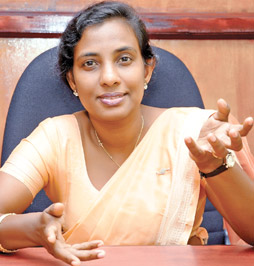 |
|
TRC Deputy Director
Compliance
Menaka H Pathirana |
Well, unfortunately, I lost my 'personal assistant' last week which
made me go berserk,and how detached I felt from the rest of world
without my contacts, especially me being a newsman.
However, fate was on my side, as I had to sit and think for a while
what I should do next. Not to mention that I was clueless as to how to
act when I lost it.
As seen and heard through the media before and some promising advices
received from friends, I decided to call my mobile service provider and
block my number. So whoever finds it and with malicious intent would not
be able to make any lengthy calls and fatten my bill or use it for some
unlawful activity that would eventually put me in trouble.
Secondly, after a patient wait for several days in the vain hope of
somebody picking it up, my desperate calls to my phone (the phone was
mysteriously switched on and off from time to time) I decided to lodge a
complaint with the nearest police station.
I explained to the police constable who recorded my entry of how I
thought I would have lost my phone on the train.
The officer advised me to report the loss to the Telecommunications
Regulatory Commission of Sri Lanka or popularly known as the TRC.
With the copy of my police entry I met the duty officer in charge of
accepting public complaints of the lost phones at the TRC Nimala Kantha
who explained what the future status of my lost phone will be.
I had to fill and submit an application form stating my personal
details and the details of the phone including the number and the IMEI
number.
He told me how the ‘famous IMEI number’ or the acronym for
International Mobile Station Equipment Identity will be then sent to all
the mobile service providers in the country to blacklist that IMEI
number in their systems. If somebody tries to use the lost or stolen
phone with a brand new SIM card purchased from any of the alerted mobile
service providers or operators, it will be indicated in their system.
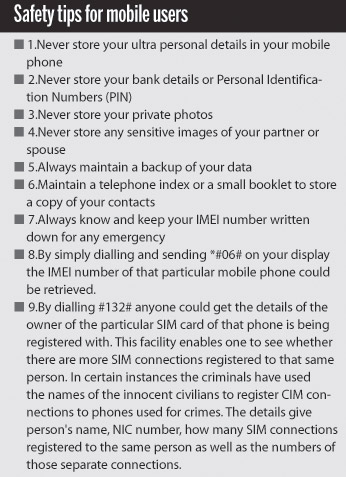 In other words, as soon as somebody sends a simple text message or
makes a call from the lost phone through the newly inserted SIM card, an
alert will be made in the system of the particular mobile service
provider that the previously blacklisted IMEI number of the lost or
stolen phone has been reactivated. In other words, as soon as somebody sends a simple text message or
makes a call from the lost phone through the newly inserted SIM card, an
alert will be made in the system of the particular mobile service
provider that the previously blacklisted IMEI number of the lost or
stolen phone has been reactivated.
And once any service provider gets such an alert on their system
about a lost phone, the former will immediately inform the TRC about
this.
With this information in hand, I was given a receipt by the officer
with a set of guidelines to be followed next, whether the phone is found
or not. Seeing the queue of complainants outside his office and the tall
pile of lost phone application forms on his desk I could not help but
ask him whether they were collected throughout the past couple of weeks
but to my utter suprise he replied that those had been collected since
morning.
With this revelation I decided to have a word with his superior TRC
Deputy Director Compliance (Consumer Complaints and Consumer/Public
Awareness) Menaka H Pathirana to get some insight into the situation.
According to Pathirana, the TRC receives a staggering 100
complainants related to lost phones per day. Since the inception of this
service about five years ago to assist the public to recover lost or
stolen phones, the unit had received close upon 90, 000 complaints to
date, which is a high figure.
Would you believe it that the demand is such that the staff of this
unit is doing its level best to receive these complaints everyday and to
coordinate with mobile service providers and the police to recover the
phones.
This is not an easy task when there are 23.5 million phone lines
being operated in a country where the population is only 21 million.
Currently there are 3.5 fixed landline connections registered with the
TRC and and the rest of the 20 million connections are mobile phone
subscribers.
This necessarily does not mean that there are 20 million phones being
handled in the country but maybe there are several SIM cards being
registered under the same person.
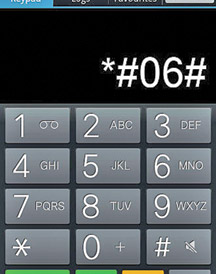 |
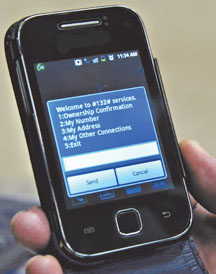 |
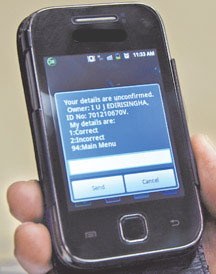 |
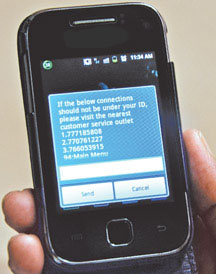 |
|
International code for IMEI check |
The menu of the 132 service (#132#) |
Ownership confirmation details |
The connections under one's ID
Pix: Thilak Perera |
Explaining more about the phone recovering service, Ms. Pathirana
said that once the mobile service providers detect a reported phone
being switched on with a new SIM card in their system, they immediately
notify the TRC with an email containing confidential details of the
person who is using a new SIM card is being used to operate the lost
phone.
The name, the National Identity Card number and the address of the
new user will be sent to the TRC in this confidential email.
Once the TRC received this email they will pass it on to the
respective police station where the complainant had lodged an entry
about his or her lost phone. Simultaneously the TRC will notify the
complainant that his or her mobile phone has been traced and the
respective details had been forwarded to the police station.
At this point the complainant must go to the police station and take
the matter up with the police by producing the reference previously
given by the police for when the entry was lodged and producing the
receipt issued by the TRC.
From this point the the role of the TRC to assist the public to
recover a phone terminates and the rest is solely on the will and
commitment of the police. Once the police receives this confidential
email and in the presence of the complainant will call up the new
number.
If the third party answers, the police would notify them that the
phone they are using is a lost or a stolen one and that it should be
handed over to the police immediately. The new owner will be summoned to
the police station to record a statement and to hand over the phone.
In most cases reported in Sri Lanka the person who finds a lost phone
or somebody who maliciously steals a phone will sell it to another
unsuspecting party at low price not revealing its status.
The third party might be eager to purchase a good mobie phone at a
low price and obviously grab this once-in-a- lifetime chance but will be
in deep trouble if the authorities trace it and when it has to be
returned to the real owner.
In the event the second owner refuses to hand it over to the police,
a lawsuit will be filled against him.according to the police, so far
many second owners reluctantly hands over the phone bearing the loss of
the phone as well as the amount he paid for it.
But in reality none of this will happen as assisting to find a lost
phone is not the duty of the police. Most lost phones which have been
successfully recovered by the TRC, will hardly be found by the police if
not for the able assistance afforded by the TRC.
According to Ms. Pathirana in relation to the high number of
complaints received regarding lost phones, the ratio of recovered phones
are also high, which is a positive aspect. And the cooperation received
by the five mobile phone service providers including Dialog GSM, SLT
Mobitel, Etisalat, Hutchison (Hutch) and Bharti Airtel was appreciative.
However, once the details of the recovered phone is passed on to the
police. The duty of the TRC terminates as the latter will not have
anything to do with law enforcement and try to solve disputes between
the two parties.
However, the important thing that should be kept in mind is that the
mobile phone is an object that can be lost at anytime. She said that
some people who at one moment will clutch the phone as if it were some
valuable object will at the next moment carelessly leave it around.
And once they come to complain the first remark they make is, “it is
not the phone that I am worried about but the data and the pictures
stored in it”. Most of the lost phones were in the price range of only
Rs.5, 000 to Rs.10, 000. There is hardly a complaint regarding the loss
of an an expensive smartphone worth over Rs.50, 000.
The effort and commitment put by the staff of the TRC to revover
these lost phones is immense.
The complaints unit of the TRC was not set up with the intention of
helping to trace lost phones but to listen and accept complaints the
public has to make against mobile phone service providers and fixed line
service providers for technical glitches and unfavourable service
promotional gimmicks.
Wasting state resources and time just to find a low priced phone
merely because the owner is not concerned about the phone but only the
precious data stored in it is an absolute waste of time. If that is the
case a backup of the data should always be maintained is the advice
given by the authorities.
The TRC instructs mobile phone users to be aware of how to use a
mobile phone.
It is just a matter of time. One should note it down in a notebook so
the he or she does not solely depend on the information stored in the
mobile phone.
Or if it is a modern smartphone it could be plugged to a computer to
create a backup of data, pictures, personal details, songs or any other
entertainment material into a modern data string cloud provided free of
charge by email and search engines.
Most importantly people should know what should be stored in a mobile
phone and what should not. Many people store personal pictures and
sometimes private images of his or her spouse or partner which could be
easily accessed by a stranger once its lost.
Storing important data and details of oneself only on the mobile
phone without a backup is unforgivable. Maintaining a backup is
paramount.
Safety tips for
mobile users
1.Never store your ultra personal details in your mobile phone
2.Never store your bank details or Personal Identification Numbers (PIN)
3.Never store your private photos
4.Never store any sensitive images of your partner or spouse
5.Always maintain a backup of your data
6.Maintain a telephone index or a small booklet to store a copy of your
contacts
7.Always know and keep your IMEI number written down for any emergency
8.By simply dialling and sending *#06# on your display the IMEI number
of that particular mobile phone could be retrieved.
9.By dialling #132# anyone could get the details of the owner of the
particular SIM card of that phone is being registered with. This
facility enables one to see whether there are more SIM connections
registered to that same person. In certain instances the criminals have
used the names of the innocent civilians to register CIM connections to
phones used for crimes. The details give person's name, NIC number, how
many SIM connections registered to the same person as well as the
numbers of those separate connections. |

